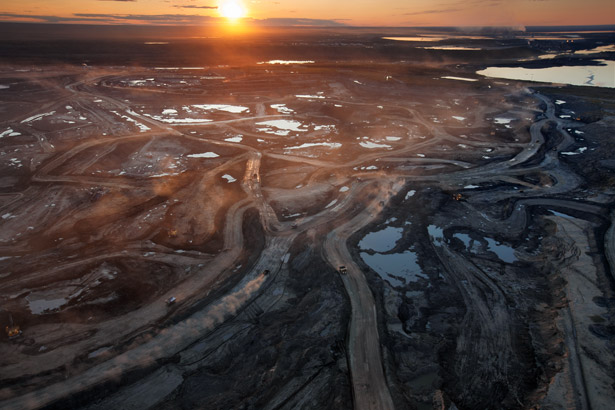[captionpix align=”left” theme=”elegant” width=”320″ imgsrc=” http://www.stephentaylor.ca/wp-content/uploads/2012/03/thomas-mulcair-100.jpg” captiontext=”Opposition leader Thomas Mulcair has been one of the most vocal opponents of the oil sands development.”]
June was a month full of debate regarding the effect of Alberta’s oil sands on Canada’s economy and environment. At the center of the debate is the question of whether or not the resource boom in Western Canada has negatively impacted the country’s manufacturing sector, largely located in Ontario and Quebec. This phenomenon is known as the Dutch Disease—a term that originated in the 1970s to describe the economic problems faced by the Netherlands after the discovery of large gas reserves off its coast. The theory is relatively simple: as the demand for Canadian oil rises, so does the value of the dollar. A higher dollar raises the exchange rate, making it more expensive to buy Canadian goods, which negatively impacts sectors of the economy that depend on trade. If this trend continues over time, there is concern that trade dependent sectors such as agriculture and manufacturing will all but collapse, as happened with the Netherlands’ manufacturing sector in the 1960s.
An Overly Simplistic Explanation?
According to New Democratic Party (NDP) leader Thomas Mulcair, the Dutch Disease is to blame for the decline of the manufacturing sector in Ontario and Quebec. Mulcair blames the loss of some 550,000 manufacturing jobs in central Canada on the failure of the federal government to enforce legislation that takes into account the economic impact of exploiting natural resources. To be fair, since 2000 there has been a simultaneous increase in the value of the dollar and a decrease in the manufacturing sector’s share of total value added to our gross domestic product (GDP) and total employment in the economy. But does this necessarily determine a causal relationship between the two phenomena?
Further investigation into the relationship between the rising dollar and shrinking manufacturing sector clearly indicates that the relationship is not so simple. In a recently issued report by the Institute for Research on Public Policy—an independent Canadian think tank—researchers examined the link between energy prices, the rising dollar and 80 different manufacturing industries. They found that only 25 of the 80 industries under investigation demonstrate a clear negative relationship between output and the US-Canada exchange rate. Interestingly, the sectors affected were small and labour intensive, primarily in textiles and apparel. Larger industries such as automotives, food products and metals do not appear to be effected.
[captionpix align=”left” theme=”elegant” width=”320″ imgsrc=”http://img.tootoo.com/mytootoo/upload/50/504451/product/504451_541faffdb859852dafead516fd86bde6.jpg
” captiontext=” Oil in Canada is found in the form of bitumen—an unconventional type of petroleum that is extremely thick, different from the free flowing crude oil found in the Middle East.”]
Canada’s Lagging Competitiveness
Blaming the booming resource sector for the decline in manufacturing ignores crucial parts of the story. This is at least partially a result of the rise of manufacturing in Asia, where cheaper labour makes it difficult for western companies to maintain their competitive edge. This is part of a larger worldwide trend, with Western manufacturing suffering, largely owed to increased competition from emerging markets in Asia. The Dutch disease explanation also ignores the way in which the booming economy in western Canada provides a large domestic market for Canadian manufactured goodss, according to the Macdonald-Laurier Institute.
The Federal Government needs to prioritize enforcing policies designed to increase the competitiveness of Canada’s declining manufacturing sector. The most recent OECD survey of Canada’s economy highlights the need to increase innovation and research and development (R&D) in business, which currently sits at very low levels for OECD standards. Increasing innovation will be one of the key long-term challenges for federal policy makers. Although this is an important part of the government’s agenda, it has thus far failed to translate into real action. There is also a growing need to find new job opportunities for workers in the manufacturing sector who are unemployed. This should include job training to move these workers who traditionally held low-skilled jobs into high skilled value-added manufacturing positions.
Looking Forward
That being said, there is still substantial room for improvement in the way in which the development of the oil sands is being managed. Concerns over the effect that the exploitation of this resource will have on the environment in the medium and long term are legitimate and must be addressed.
There is also a significant regional aspect to this debate. Alberta is home to 98% of Canada’s oil—the second largest proven reserve in the world—and thus reaps the benefits more so than other province. Furthermore, the Federal Government receives 36% of all taxes and royalties generated by oil and gas companies. This is money that can be used to lower taxes and improve services for all Canadians. Canada is not a petrostate—revenues from oil and gas only make up 4% of its GDP—a far cry from the 20% required to meet the IMF’s definition. This important national debate needs to continue, but on the basis of sound data and economic reasoning, rather than the political rhetoric and emotions that have largely fuelled it thus far. If this can be accomplished, the oil sands stand a real chance of being a blessing rather than a curse for Canada, something which many oil rich states may never be able to say.



